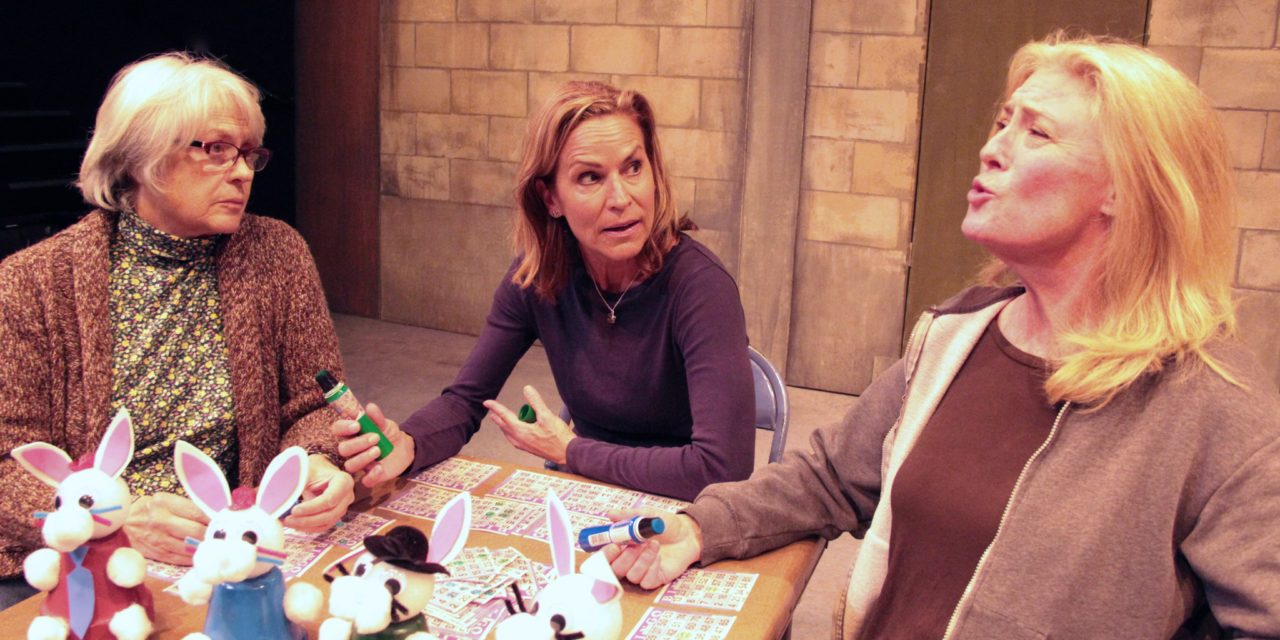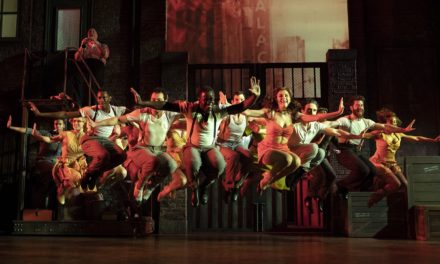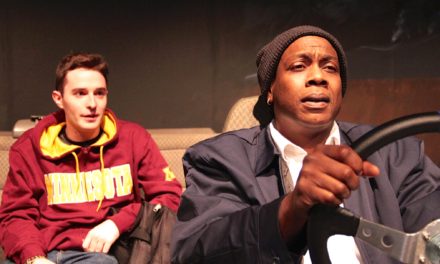(Above: Left to right, Ellen Chace, Storm Kennedy, and Ruth Adele Mandsager in Oregon Contemporary Theatre’s Good People; photo courtesy of OCT)
By Randi Bjornstad
Among the adjectives that various reviewers have used to describe Good People — the play runs May 17-June 2 as the closing production for Oregon Contemporary Theatre’s 2018-19 season — are “painfully funny,” “gut-wrenching,” “timeless,” “wonderful,” “brave,” and “almost subversive.”
Anyone who has ever been down-and-out in our contemporary society probably can relate, and those who haven’t might want to see it to expand their horizons.
The play centers around Margie — played by veteran actress Storm Kennedy — who has pretty much always been part of the have-not segment of American society. But now things are worse than ever: she’s achieved middle age; she’s unemployed; she’s a single mom; she’s about to be evicted for non-payment; and she doesn’t see any prospects for life improving any time soon.
In the midst of all this angst, Margie hears tell that her long-ago high school boyfriend, Mike — acted here by William M. Hulings — has achieved success as a high-paid doctor. In her desperation Margie seeks him out, hoping to find some help in her days of dire need.
That creates the tension in the plot, providing the springboard for an examination of just what it means to be a good person, whether you’re set for life or struggling.
As OCT’s producing artistic director put it in announcing the play, Good People is “a striking reflection of the triumphs and struggles for people struggling to live good lives when facing difficult circumstances.”
Kennedy said she first did an excerpt scene from Good People in Portland three years ago, “and I loved it — I loved the play, and I loved the characters.”
So when OCT asked her if she would be interested in the role — “I had already basically auditioned for it during a staged reading some time ago,” Kennedy said — the answer was a quick yes.
“I was attracted to the role because Margie is a strong woman — a single mom with a special needs child, who works really hard but who doesn’t seem to have luck and fate on her side,” she said. “But I believe she’s a good person. She’s a good mom, and she’s a good friend.”
The play takes place in South Boston, “which I think can be a tough place for many people to live and get by,” Kennedy said. “Margie is at kind of her lowest point when the play opens, and then she hears that her successful ex-boyfriend is back in town, and she thinks, ‘Maybe I’ll see if he’s maybe got something for me. ‘ “
The characters in the play apparently are based on real people that playwright David Lindsay-Abaire knew growing up in Boston, “so they seem very real,” Kennedy said. “But that also means they are not perfect — sometimes they are doing all the things that seem right to them, but looking in at it from the outside, other people would say, ‘No, that’s not the right thing to do.’ But the more we picked the script apart as we started working on it, the more I loved the writing.”
She especially admires the way director Kirk Boyd has shepherded the OCT production.
“He watches every minute of it for not only the lines themselves but for movement and connotation — I swear he must go home every night and read the whole play over again,” Kennedy said. “There are several places in this play that the same line occurs more than once, and once you realize that, the meaning of the play becomes much richer for the connection. That was a fascinating process.”
Above all, Good People “is real-life stuff,” Kennedy said. “It’s about relationships, but it also brings up universal questions about class, commitment, and staying true to your roots and your values. Underneath it all, it challenges you do think about what it means to be a good person.”
The play is solidly based in South Boston, so there are some idioms that outsiders might not recognize, Kennedy said, such as “welly cheese,” short for welfare cheese often given to poor residents as part of government food allotments, and “Sully’s,” a reference to Sullivan’s, a fabled diner still in existence in “Southie,” which of course means South Boston.
Prolific and often-honored playwright Lindsay-Abaire won the Pulitzer Prize for Drama in 2007 for his play, Rabbit Hole, and Good People won a raft of its own awards, including Best Play from the New York Drama Critics Circle, plus two Tony nominations. Some of his other successes include the book and lyrics for Shrek the Musical and scripts for Ripcord, Fuddy Meers, and Wonder of the World.
In addition to Kennedy and Hulings, the cast of OCT’s Good People includes Ellen Chase, Ruth Adele Mandsager, and David Arnold.
Along with Boyd, the production team features Jeffrey Cook on scenic design, lighting designer Michael A. Peterson, costumes by Jeanette deJong, sound by Taylor Freeman, props designer Rebecca Blanchard, and production stage manager Christie O’Neill.
Good People
When: Pay-what-you-can preview shows (suggested $15 donation) at 7:30 p.m. on May 15-16; regular evening performances at 7:30 p.m. on May 17-18, 23-25, 30-31, and June 1; and 2 p.m. Sunday matinees on May 26 and June 2
Where: Oregon Contemporary Theatre, 194 W. Broadway, Eugene
Admission: $40 on opening night, May 17, includes wine beer, dessert, and a cast reception following the show; remaining performances $20 to $40 ($15 for students with valid ID); tickets available at the box office, 541-465-1506, or online at octheatre.org












